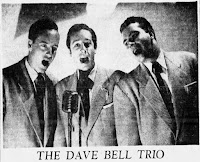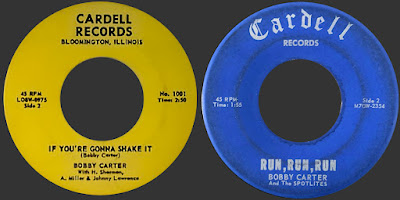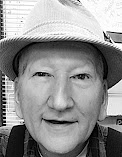RoFran Enterprises was a recording studio and record label owned and operated by Roger Francisco in Urbana, Illinois from 1965 to 1973.
Over the course of those nine years, the studio produced roughly 120 singles, EPs and albums combined, with almost all of them pressed in very small quantities. The majority of the musicians found on those releases were from downstate Illinois or associated with the University of Illinois in some way.
In the late 1960's, the Champaign-Urbana music scene was exploding with talent. Blytham Ltd, a local booking agency led by Bob Nutt and Irving Azoff, represented nearly every major rock and pop group in downstate Illinois and was quickly making Champaign-Urbana the music hub of the Midwest.
RoFran Enterprises was in prime position to be the go-to studio for the burgeoning scene and yet that never happened exactly. RoFran instead operated on the periphery, producing far more school and church recordings than rock albums.
While the studio eventually became closely associated with the U of I folk scene centered around the Red Herring coffee house, RoFran appears to have had little overlap with the larger rock scene happening in the area. That is, if we only look at the records that were released.
The studio's log book (above) however offers an alternative view. One that demonstrates the full scope of the studio's operation. Not only does it provide a complete (?) list of the official releases (pages 2-5) but it reveals dozens of sessions by area rock groups, most of which never saw any type of release or pressing.
This includes "lost" sessions by REO Speedwagon, Finchley Boys, One-Eyed Jacks, Head East and Arlie Neaville. Other lesser known Champaign bands such as Feathertrain, Bluesweed, Uncle Meat and Backstreet all recorded there. In fact, Irving Azoff and Bob Nutt appear to have used the studio regularly to record demos of the many downstate groups in their stable. These sessions represent only the tip of the iceberg.
RoFran Enterprises, these days, is probably best known amongst hardcore record collectors for a handful of difficult-to-find 45s. Now, with the help of this log book, hopefully a more complete story can start to be told.
_____________
Roger Francisco was born in Decatur and grew up in Springfield, Illinois. He moved to Urbana in the 1950's to pursue a degree in electrical engineering at the Univerity of Illinois and eventually worked at the Magnavox plant in Urbana. Francisco was also a musician and audio engineer who, in 1964, had spent time in a Nashville studio playing bass with Mike Brewer and the Galaxies.
Inspired by what he saw in Nashville, Francisco built a modest recording studio on the lower level of his bi-level home at 5 Rainbow Court in Urbana. There he began recording local groups as well as jingles and commercials for area businesses.
By the end of the first year of operation, RoFran had released several 45s on the RoFran label including singles by the Intruders, the Rogues, the Impalas and
Lee Rust. In addition, RoFran also produced a number of LPs with most of the early albums being remote recordings of area choirs and school bands.
Francisco's own group, the Prodigies aka Sound Studio One, recorded and released a total of four singles during this early period as well. Most of the members in the group would help serve as the studio's house band. This included: Fredrick "Bill" Steffen III on drums, J. Gordon Wilson on keyboards and Howie Smith on saxophone. At the time, Smith was also a member of the University of Illinois Jazz Band.
Another important addition to the RoFran family was guitarist Al Ierardi. Ierardi recorded his own single at RoFran in December of 1966. He would go on to work at the studio as a session player as well as a staff artist and a producer. Ierardi is credited with writing the 1967 Ravins' b-side "I Had A Feeling" recorded at RoFran as well as designing the album jacket for one of J. Gordon Wilson's albums.
According to the October 21, 1967 issue of Billboard magazine, "RoFran Enterprises in Urbana. Ill., is expanding its operation and has moved into new offices at the Masonic Temple Building, 115 West Main Street, Urbana. President Roger Francisco, whose record releases are distributed by M -S Distributors in Chicago. says the firm is expanding its pop music production under a&r man Howard A. Smith."
RoFran's expanded services included arranging, composing and song publishing. In late 1966, Francisco is credited with helping write, arrange and produce a single with the Lindsey Triplets (
aka ABC Triplets) from nearby Philo.
While the music operation was growing, the advertising side of the business took off as well. Francisco, who had been doing radio jingles and commercials from the very beginning, listed his business in the local yellow pages under the heading of "Advertising Agencies."
Soon the business was taking on ad work beyond just radio jingles. In early 1967 RoFran was hired to do all of the advertising for the local MacDonald's including newspaper ads, radio spots and even personal appearances. As a result, saxophonist and a&r man Howie Smith also served as Ronald MacDonald for many years in the Champaign-Urbana area.
By early 1967, the studio had for the most part stopped using "RoFran" as a label name and instead used "A Custom Product of RoFran Enterprises" or simple Custom on the label. Often the artist would choose their own label name such as Psychedelic, Star, Shades, Soul, Syndicate, Golden and Folksound.
As the label names suggest, a wide variety of music was being captured at the studio in the late 1960s. Country artist Marvin Lee recorded an album and at least one single at RoFran. The studio also recorded a number of Champaign-area soul and gospel groups including Count Demon, Leroy Knox and the Gaypoppers, the Soul Brothers, the Golden Star Singers and the Holy Zyrnes. Jazz trumpeter Cecil Bridgewater would record and release a single in 1968.
The studio also attrached bands from nearby communities such as the Shades of Blue and the Keepers (both from Danville), The Quarternotes (Rantoul), The Ravins (Gibson City), The Cameros (Petersburg) and Howie Thayer (an Illinois State University student originally from La Moille in north-central Illinois).
The "lost" sessions from 1966-1969 include a who's-who of Blytham artists: One-Eyed Jacks, Finchley Boys, The Regiment, Seeds of Doubt and Somebody Groovy. Multiple sessions are simply listed under Blytham, Bob Nutt or Irv Azoff. Other bands that made demos at the studio during this period include The Bacardis, The Chandras, Fat Daddy Five, Reel Blues and Arlie Neaville.
By the late 1960's, RoFran became closely connected with multi-instrumentalist Jim Cuomo and his avant-garde group, Spoils of War. So much so that Roger Francisco and Al Ierardi both performed and recorded with the group.
In 1969, Spoils of War released a 7" EP containing two nine-minute pieces that combined psychedelic songs with electronic textures. According to an interview in
It's Psychedelic Baby Magazine, Cuomo said a 1,000 copies were pressed at the time. Cuomo would record another EP under his own name the next year.
By 1970, the RoFran records were starting to be pressed by Century Custom Recording Service. In a 1970 Daily Illini article, RoFran Enterprises was mentioned as being a subsidiary of Century Records.
Around that same time, the RoFran studio moved out of Francisco's basement and into a new location at the corner of Race and Washington (117 W. Washington) in Urbana.
By October of 1970, neighbors of the new location filed a petition against the studio. They claimed that "loud sounds and vibrations come from the studio until 2 or 3 am, making it difficult for them to sleep." An article in the Daily Illini mentions that police had been called 15 or 20 times. Francisco's wife was quoted in the paper saying the real issue was that the neighbors didn't like "long hairs."
Blytham Ltd continued to use the studio to record demos at this time, undoubtedly contributing to the "noise" and "long hair" complaints. This included sessions by REO Speedwagon, Bluesweed, Feathertrain, Backstreet, Esquires, Uncle Meat and Sunday. A few of these recordings still exist and have been archived by the University of Illinois at the
Sousa Archives.
It was around this same time that RoFran began to produce a series of live albums from the Red Herring Folk Festival, several of which contain early recordings of Dan Fogelberg. Another performer, Peter Berkow, soon joined RoFran Enterprises as an engineer. A Daily Illini article comments that Berkow had practically moved into the studio.
Francisco and Berkow also began working with a group of folk musicians from that same scene on a concept album / band that would eventually be known as The Ship, a Contemporary Folk Music Journey. Both Francisco and Berkow would become managers of the group and recorded a demo of the concept piece in the Fall of 1971.
The group eventually signed with Elektra Records and recorded the album with producer Gary Usher at the label's studios in Los Angeles. The group however was unhappy with certain "special effects" added by Usher and flew Francisco out to Los Angeles to help remix the album. Released in October of 1972, the final version of the album contains Francisco's mix.
The Ship was one of the last big projects of RoFran. Some of the lost sessions from 1971-1973 include Mackinaw Valley Boys, All Star Frogs, Heavy Duty, US Kids, Hound Dog Moses, One-Eyed Jacks, and The Guild. Unreleased sessions by Head East and Sunday from December 1972 are preserved at the Sousa Archives.
In 1973, Francisco sold the studio to Al Ierardi who renamed it the Tape Factory. Over the next decade, Francisco went on to work as an engineer at two other Champaign-Urbana studios: Silver Dollar and Creative Audio.
As if that wasn't enough, Francisco had a long and fascinating career beyond recording studios. For some, Francisco is best known as the voice of the FitnessGram PACER test. For a recent interview (Aug 2023) with Francisco see the
WKIO Homegrown podcast.
Special thanks to Al and Carla Ierardi for preserving and sharing the RoFran Enterprises studio ledger.
For a more concise list of 45s released by the studio see our
RoFran Records discography. Now you can also
listen to many of the early RoFran records.

































